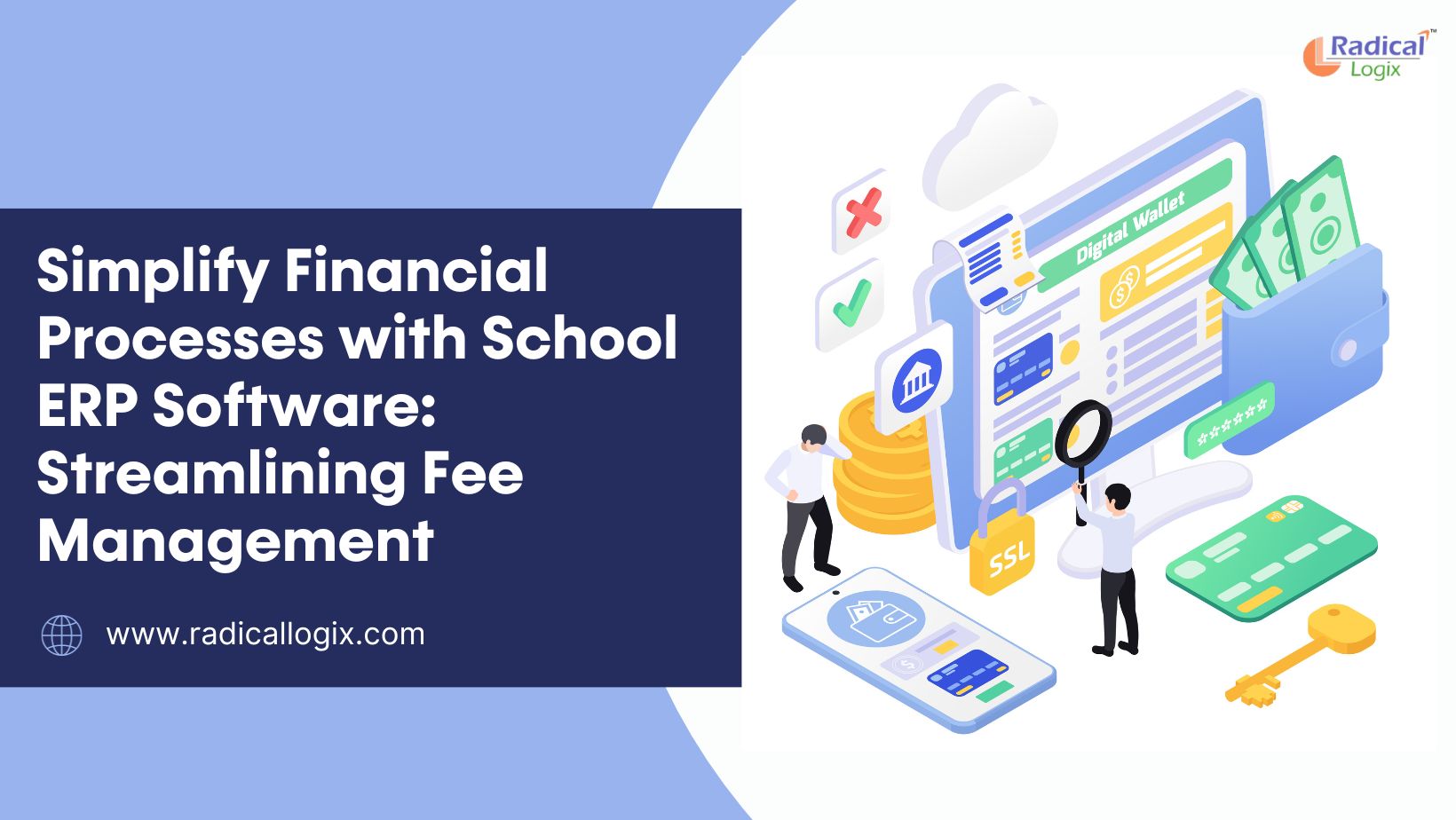Streamlining Fee Management: Simplifying Financial Processes with School ERP Software

Managing finances within educational institutions can be a daunting task. The complexities of tuition collection, fee tracking, and financial reporting can be overwhelming. However, in today's digital age, there's a powerful solution to simplify and streamline these financial processes: School ERP (Enterprise Resource Planning) software. In this article, we will explore how School management software can revolutionize fee management, making it more efficient, transparent, and hassle-free.
1. Challenges in Fee Management
In the realm of education, efficiency and transparency are key, and ERP software is a game-changer when it comes to fee management. Many educational institutions, whether schools, colleges, or universities, face several common challenges when it comes to managing fees:
Fee Collection: Traditional fee collection methods often involve manual, time-consuming processes, such as counting cash, issuing receipts, and reconciling accounts.
Tracking Payments: It can be challenging to keep track of individual student payments and outstanding fees. The risk of errors or missed payments is high.
Communication: Informing parents and students about upcoming fee deadlines or changes can be cumbersome and ineffective with paper-based systems.
Financial Reporting: Generating reports on fee collections and outstanding balances can be time-consuming and prone to errors when done manually.
2. The Role of School ERP Software
School ERP system is a comprehensive solution that integrates various functions within an educational institution, including fee management. Here's how it can simplify financial processes:
Automated Fee Collection: With School ERP, fees can be collected electronically, reducing the need for manual cash handling. Parents and students can pay fees online via credit/debit cards, bank transfers, or digital wallets, making the process convenient and efficient.
Real-time Payment Tracking: The software maintains a centralized database that records all fee payments in real-time. This allows for accurate tracking of payments, reducing the risk of errors and the possibility of overlooked fees.
Automated Reminders: School ERP software can send automated reminders to parents and students about upcoming fee deadlines or changes, ensuring that no important information is missed.
Customised Fee Structures: Institutions can set up customized fee structures to cater to various categories of students or different fee types, such as tuition, extracurricular activities, or exam fees. This flexibility allows for precise fee management.
Transparency and Accountability: Parents and students can access their fee accounts through the ERP system, promoting transparency and accountability. They can view their payment history and balances anytime, reducing disputes or confusion.
Financial Reporting: Generating financial reports becomes a breeze with School ERP software. The system can generate detailed reports on fee collections, outstanding balances, and revenue analysis, providing administrators with valuable insights into the institution's financial health.
Data Security: School ERP systems employ robust data security measures to protect sensitive financial information, ensuring that payments and financial records are kept confidential and secure.
3. The Benefits of School ERP Software in Fee Management
The benefits of implementing School ERP (Enterprise Resource Planning) software in fee management within educational institutions are multifaceted and have a significant positive impact on both the institution and its stakeholders. Here are the key advantages:
Efficiency and Time Savings: School ERP software streamlines fee management processes by automating fee collection and tracking. This reduces the manual effort required for fee handling, such as counting cash, issuing receipts, and reconciling accounts. Administrative staff can allocate their time more efficiently, focusing on other essential tasks.
Reduced Errors: Automation minimizes the risk of human errors in fee collection and tracking. This results in more accurate financial records and eliminates the potential for missed payments or miscalculations.
Convenience for Parents and Students: School ERP software enables online fee payments, allowing parents and students to pay fees through various electronic methods, such as credit/debit cards, bank transfers, or digital wallets. This convenience enhances the overall experience for families, as they can make payments from the comfort of their homes.
Real-time Payment Tracking: The software maintains a centralized database that records all fee payments in real-time. This means that administrators can monitor payments as they happen, reducing the risk of discrepancies and enabling quick intervention if issues arise.
Automated Reminders: The system can send automated reminders to parents and students about upcoming fee deadlines, changes, or important updates. This proactive communication ensures that all relevant information is promptly conveyed, reducing the likelihood of missed payments.
Customized Fee Structures: Schools can configure the software to accommodate various fee structures, catering to different categories of students or types of fees (e.g., tuition, extracurricular activities, exam fees). This flexibility allows institutions to manage their fees in a way that suits their unique needs.
Transparency and Accountability: School ERP software promotes transparency by allowing parents and students to access their fee accounts. They can view their payment history, outstanding balances, and any additional fees owed. This transparency fosters accountability and minimizes disputes or misunderstandings.
Financial Reporting: The software provides the capability to generate detailed financial reports. These reports offer insights into fee collections, outstanding balances, and overall revenue analysis. Administrators can make data-driven decisions to improve financial health.
Security: School ERP systems employ robust data security measures to protect sensitive financial information. This includes encryption, user access controls, and data backup procedures. These security features safeguard financial data from potential threats or breaches.
Cost Reduction: The automation and streamlining of fee management processes can lead to cost savings in terms of reduced manual labour, paper-based record-keeping, and potential errors that may require corrections.
Compliance: School ERP software can help ensure compliance with tax regulations and financial reporting requirements. This is especially important for educational institutions that must adhere to specific financial standards and regulations.
The Bottom Line
Best School ERP software offers a comprehensive and integrated solution to fee management in educational institutions. The benefits encompass improved efficiency, accuracy, transparency, and security. These advantages not only simplify financial processes but also enhance the overall experience for parents, students, and administrative staff, ultimately contributing to the institution's financial health and operational effectiveness.



